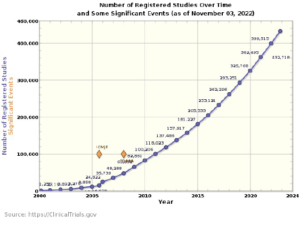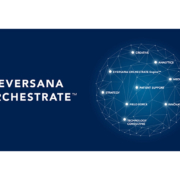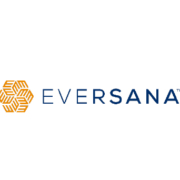Overwhelmed Doctors, Under-supported MSLs
Overwhelmed doctors, under-supported MSLs
New AI technology holds the key to improving knowledge exchange and implementation in real-world clinical practice.
By Deepak Patil
As both consumers of health services and as healthcare professionals, we want to believe that we are benefiting from the latest and best research. But especially for healthcare providers (HCPs), we have unrealistic expectations around the consumption of the latest and greatest information in research to treat their patients.
Consider the following:
- The number of published scientific papers has grown by 9% per year for the past several decades,1 while at the same time there are fewer doctors to consume the information. The Association of American Medical Colleges (AAMC) projects a shortage of as high as 124,000 physicians by 2034, with the largest disparities with specialty doctors.2
- More than 1 million papers are posted to the PubMed database annually – about two papers per minute.1
- Various industry sources count the number of medical journals worldwide at about 30,000.
- As of November 2022, ClinicalTrials.gov lists more than 432,700 studies, with locations in all 50 states and in 221 counties. From 2013 to near the end of 2022, the number of clinical trials has nearly tripled (see Figure 1).3
The first takeaway from data that measure the volume of information being produced is that HCPs have a near-herculean task to keep up with rapidly evolving treatment options for patients within their medical specialties. Primary care physicians have a near-impossible burden to sustain due to the sheer breadth of patients seen.
The second takeaway, for pharmaceutical and medical device manufacturers, is that there is a chasm between the knowledge they have, and the knowledge they would like to convey to their primary audience: HCPs and the related professions involved in prescribing, recommending, or authorizing drug and device choices.
Enter the medical science liaison (MSL). While pharmaceutical marketing departments and field sales teams assist in communicating value propositions of new treatment modalities, the MSL serves as a trusted, unbiased scientific partner for an HCP to discuss new studies and medical innovation and determine the best use within their clinical practice. It has always been a vital channel to bring new information to the market and is now an even more important one. Today, MSLs have the added responsibility of bringing information back to research organizations, to identify and understand crucial gaps in healthcare services that can be addressed by the company. With physician feedback, MSLs can also influence the design of clinical trials and enhance a company’s understanding of how a certain therapy is accepted in clinical practice.
The AI assist to information management
The good news is that there are many data sources — and data-management tools — to help inform decision-making. While there are various customer relationship-management (CRM) systems that can be adapted to use by MSLs, their utility is limited. The biggest challenge is synthesizing all the different structured and unstructured data in real time so they can be analyzed for actionable insights and delivered to MSLs through a single, easy-to-use platform. A solution is emerging from technology that is already being used successfully by other areas of the life sciences organization: artificial intelligence (AI).
“MSLs generate a lot of valuable data themselves, often in the form of unstructured call notes, plus there are many sources of purchased data like real-world evidence, influencer data, clinical study data, and more,” explained Dan DeStefano, global medical affairs, digital implementation lead at GSK. “If you apply the right AI engines, you will get increasingly better insights. The key is to continually invest in these technologies and adopt a ‘product mindset’ rather than a ‘project mindset’ – like the way software providers deliver periodic product enhancements. We need to keep evolving and improving.”
A related challenge is learning to strategically leverage various new engagement channels while coordinating with internal corporate medical functions and, where appropriate, commercial functions to meet HCP expectations for orchestrated interaction. At the same time, MSLs are being asked to help inform brand strategy with their learnings from talking to leading healthcare professionals.
Some MSLs are stuck using the same old technology tools of old – yes, think spreadsheets – because the available tools do not meet their unique needs or are so siloed that they become more of a hindrance than a help. In an internal survey of MSLs, a top-20 global pharmaceutical company found that most are frustrated with all the fragmented data sources that they must track. Many MSLs resort to manually curating information from a myriad of third-party sources, including publications, clinical trial databases, conferences, grants, unmet needs in clinical care learned from KOLs, and clinical guidelines from medical societies – without the same analytics technology integrated into automation platforms.
“MSLs need to customize engagements based on an individual stakeholder’s needs and interests, and there are a wealth of tools, data, and advanced data analytics available to provide a 360-degree view of individual external experts. MSLs need to be able to leverage all the resources that are available to them to enhance their interactions with each KOL and the insights they bring back to the organization,” said Emily Howman, senior medical strategy lead at Envision Pharma.
Howman continued, “AI can streamline the process to determine individual preferences and associated next-best-action recommendations based on a KOL’s activities, interests, and preferences.”
Keeping up with key opinion and digital opinion leaders
Empowering MSLs with platforms that can aggregate, synthesize, and tailor data from various sources in real time to meet the interest of each key opinion leader (KOL) relationship is now fundamental to success. “MSLs are key purveyors of scientific truth and viewed highly by HCPs/KOLs, and they are driven by their passion to help patients. Medical affairs organizations should empower them with tools that make their jobs easier and maximize their impact,” wrote Sabita Sankar, Ph.D. and Lana Feng, Ph.D. in The MSL.
In addition to helping MSLs better personalize interactions with KOLs, the right technology can free up time and capacity to engage with a broader set of stakeholders – for instance, community physicians, digital opinion leaders, and emerging researchers in a therapeutic area. Advanced AI analytics platforms can turn the tide by providing MSLs with richer insights that foster important relationships with influential HCPs and, ultimately, bring the latest breakthrough treatments to patients faster.
Targeted content is also paramount in the virtual engagement era, where KOLs value MSLs who provide them with exactly the information they need at the right time. AI-powered platforms that can recommend the right content to deliver to KOLs on-demand is the key.
“The goal is to have very targeted content for KOLs,” said DeStefano. “A continuously improving AI engine makes it dramatically faster, easier, and more effective to send the right content but there is also a human element that must be applied to create and select the best content for each medical expert.”
Finding the next best action
While CRM systems are relied on by thousands of pharmaceutical sales teams, they are not uniquely designed to automate the collection of the detailed scientific information MSLs need and synthesize it into insights to coincide with the KOLs’ interests. For instance, MSLs need insights into latest developments across their target therapy area in addition to a deep knowledge of pipeline and branded products. This may include details about disease management/treatment guidelines updates, novel biomarkers and mechanisms of action, and the latest clinical data from other investigational therapies.
“MSLs often use a CRM system to capture visit notes and other information in the field, but much of that information slips into a black hole,” explained DeStefano. “In order to harness KOLs’ valuable feedback, we need to combine it with other related data sources, apply AI, identify trends, and then feed that back to MSLs in the form of next-best-action recommendations – delivered in their daily workflows.”
Use of AI applied to unstructured data can also result in insights to bring back to pharma research teams. One can envision the selection process for identifying the best clinical trial investigators for a project. What are the key criteria? Volume of research papers? Number of conference presentations? Dedicated resources at an academic medical center? In reality, it can be all of these and more. Bringing all these considerations together in a timely manner to invite trial participation can become a competitive advantage — especially in an era where there is intense competition to attract the best investigators.
MSLs also bring back information about therapy area unmet needs, indication expansion, and any workflow concerns that might impact the utilization of new therapies. A system that can streamline sharing this important information to the rest of the organization dramatically increases impact.
Orchestrating the engagement
Numerous industry surveys of how pharma companies interact with HCPs have shown a contradictory pair of objectives. On the one hand, HCPs do not want their precious time wasted in unhelpful meetings with pharma representatives. On the other, there is a heightened need for more assistance in keeping up with new research and trends. An added degree of difficulty is that HCPs are more outspoken about how they wish to consume information: online, in video or webinars, and face-to-face.
“Orchestrated omnichannel engagement” has grown into a buzz phrase for commercial teams ever since they started using digital communications channels to engage with doctors. For MSLs, this is even more significant as a lack of careful coordination of their company’s collective engagement with KOLs can mean the end of a valuable relationship years in the making. AI platform technology can play a role here, too. Advanced AI-enabled technology can quickly assess a pharmaceutical company’s total outreach with an individual doctor, and then recommend the next best action in the best sequence – even if the next best action is no action at all. Omnichannel engagement with KOLs that’s well orchestrated across the entire organization may be the most significant way that AI-enabled platform technology can impact business goals.
Digital is one component of omnichannel that has grown in importance with the pandemic. “Many medical leaders are embracing digital following the forced adoption of digital channels during the height of COVID-19. Now, organizations recognize the value of all the data that can be collected this way and how important it is to turn it into insights,” concluded DeStefano. “Forward-thinking organizations will make this a top-down priority to invest in digital capabilities for their medical affairs organizations — this is essential for long-term success.”
The importance of the MSL has increased in lockstep with the growth of clinical trials, new research publications, and new drugs themselves. Drug-based therapy is a more complex field today, with the advent of genetic and cellular knowledge guiding the development and administration of those therapies. MSLs are no longer “just” educating and informing doctors but helping to accelerate medical science innovation. AI tools can bring a new level of insight to the MSLs’ tasks, and result in better outcomes for the patient, the HCP, and the pharmaceutical research enterprise.
References
- Landhuis, E. (July 20, 2016). “Scientific Literature, Information Overload.” Nature.
- Renfrow, J. (July 15, 2021). “AAMC Estimates 124k More Physicians Will Be Needed by 2034.” Fierce Healthcare.
- ClinicalTrials.gov. “Trends, Charts, Maps”. Accessed November 7, 2022.
 |
Deepak Patil is a senior director of medical strategy at Aktana, where he leads the development of AI-driven intelligent engagement solutions for MSLs. He is passionate about novel applications of real-world data and artificial intelligence to drive decision making in medical affairs and R&D. A physician by training, Patil has over a decade of experience designing novel use cases of real-world data across the drug development continuum as a medical advisor at Sun Pharmaceuticals, strategy consultant at IQVIA and, most recently, as real-world data strategist at IBM Watson Health. Patil can be reached at [email protected]. |











